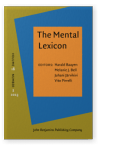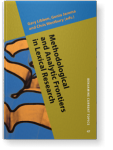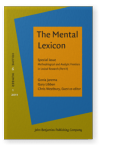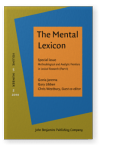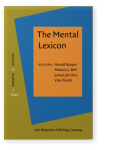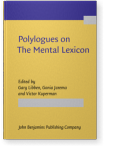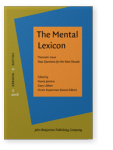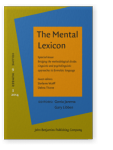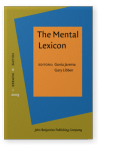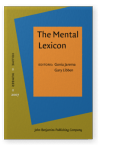Chris Westbury
List of John Benjamins publications for which Chris Westbury plays a role.
Journal
Titles
Methodological and Analytic Frontiers in Lexical Research
Edited by Gary Libben, Gonia Jarema and Chris Westbury
[Benjamins Current Topics, 47] 2012. x, 465 pp.
Subjects Cognition and language | Lexicography | Psycholinguistics
Methodological and Analytic Frontiers in Lexical Research (Part II)
Edited by Gonia Jarema, Gary Libben and Chris Westbury
Special issue of The Mental Lexicon 6:1 (2011) v, 196 pp.
Subjects Computational & corpus linguistics | Multilingualism | Neurolinguistics | Psycholinguistics | Semantics
Methodological and Analytic Frontiers in Lexical Research (Part I)
Edited by Gonia Jarema, Gary Libben and Chris Westbury
Special issue of The Mental Lexicon 5:3 (2010) v, 188 pp.
Subjects Computational & corpus linguistics | Multilingualism | Neurolinguistics | Psycholinguistics | Semantics
2022 Is it you you’re looking for? Personal relevance as a principal component of semantics The Mental Lexicon 17:1, pp. 1–33 | Article
Previous evidence has implicated personal relevance as a predictive factor in lexical access. Westbury (2014) showed that personally relevant words were rated as having a higher subjective familiarity than words that were not personally relevant, suggesting that personally relevant words are… read more
2021 Chapter 3. Pay no attention to that man behind the curtain: Explaining semantics without semantics Polylogues on The Mental Lexicon: An exploration of fundamental issues and directions, Libben, Gary, Gonia Jarema and Victor Kuperman (eds.), pp. 45–76 | Chapter
2016 Pay no attention to that man behind the curtain: Explaining semantics without semantics New Questions for the Next Decade, Jarema, Gonia, Gary Libben and Victor Kuperman (eds.), pp. 350–374 | Article
There is a distinction in scientific explanation between the explanandum, statements describing the empirical phenomenon to be explained, and the explanans, statements describing the evidence that allow one to predict that phenomenon. To avoid tautology, these sets of statements must refer to… read more
2014 N-gram probability effects in a cloze task Bridging the Methodological Divide: Linguistic and psycholinguistic approaches to formulaic language, Wulff, Stefanie and Debra Titone (eds.), pp. 437–472 | Article
What knowledge influences our choice of words when we write or speak? Predicting which word a person will produce next is not easy, even when the linguistic context is known. One task that has been used to assess context dependent word choice is the fill-in-the-blank task, also called the cloze… read more
2012 The challenge of embracing complexity Methodological and Analytic Frontiers in Lexical Research, Libben, Gary, Gonia Jarema and Chris Westbury (eds.), pp. 1–12 | Article
2012 Formulaic sequences: Do they exist and do they matter? Methodological and Analytic Frontiers in Lexical Research, Libben, Gary, Gonia Jarema and Chris Westbury (eds.), pp. 369–393 | Article
There is a new and growing interest in psycholinguistics in the mental representation of (not necessarily phrasal) multi-word sequences and in how knowledge of these sequences relates to word, phrase, and sentence knowledge. In this paper we summarize the evidence for the existence of distinct… read more
2012 Assessing language impairment in aphasia: Going beyond pencils and paper in the computer age Methodological and Analytic Frontiers in Lexical Research, Libben, Gary, Gonia Jarema and Chris Westbury (eds.), pp. 33–55 | Article
Language is complicated and so, therefore, is language assessment. One complication is that there are many reasons to undertake language assessments, each of which may have different methods and goals. In this article I focus on the specific difficulties faced in aphasia assessment, the assessment… read more
2011 Formulaic sequences: Do they exist and do they matter? Methodological and Analytic Frontiers in Lexical Research (Part II), Jarema, Gonia, Gary Libben and Chris Westbury (eds.), pp. 171–196 | Article
There is a new and growing interest in psycholinguistics in the mental representation of (not necessarily phrasal) multi-word sequences and in how knowledge of these sequences relates to word, phrase, and sentence knowledge. In this paper we summarize the evidence for the existence of distinct… read more
2010 Assessing language impairment in aphasia: Going beyond pencils and paper in the computer age Methodological and Analytic Frontiers in Lexical Research (Part I), Jarema, Gonia, Gary Libben and Chris Westbury (eds.), pp. 300–323 | Article
Language is complicated and so, therefore, is language assessment. One complication is that there are many reasons to undertake language assessments, each of which may have different methods and goals. In this article I focus on the specific difficulties faced in aphasia assessment, the assessment… read more
2009 Imageability x phonology interactions during lexical access: Effects of modality, phonological neighbourhood, and phonological processing efficiency The Mental Lexicon 4:1, pp. 115–145 | Article
Although many studies have demonstrated the effects of imageability and phonological neighborhood size, few have examined if these factors interact. Strain, Patterson, and Seidenberg (1995) explained an imageability effect in naming low-frequency exception words (only) as being due to a slowing of… read more
2007 LINGUA: The Language-Independent Neighbourhood Generator of the University of Alberta The Mental Lexicon 2:2, pp. 271–284 | Article
LINGUA (Language-Independent Neighbourhood Generator of the University of Alberta) is a free, platform-independent (Java) program consisting of a set of tools that have been developed for three purposes: to turn corpora into frequency dictionaries; to calculate orthographic neighbourhood and N-gram… read more
Orthographic uncertainty: An entropy-based measure of word form typicality The Mental Lexicon: Online-First Articles | Article
Measures of orthographic typicality have long been studied as predictors of lexical access. The best-known orthographic typicality measure is orthographic neighbourhood size (Coltheart’s N or ON), the number of words that are one letter different, by substitution, from the target word. A more… read more
